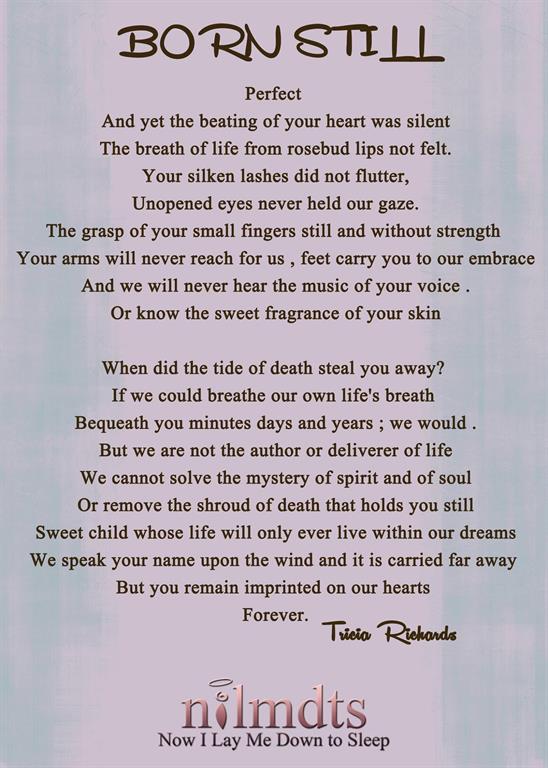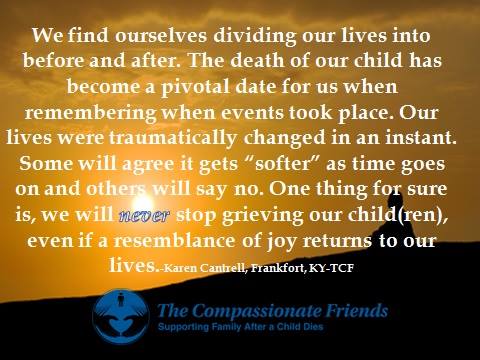It’s Okay to Grieve
It’s Okay to Grieve.
The death of a child is a
reluctant and drastic amputation, without anesthesia. The pain can-not be
described, and no scale can measure the loss. We despise the truth that the
death cannot be reversed and, somehow, our dear one returned. Such hurt! It’s
okay to grieve.
It’s
Okay to Cry.
Tears
release the flood of sorrow, of missing & of love. Tears relieve the brute
force of hurting, enabling us to level off & continue our cruise along the
stream of life. It’s okay to cry.
It’s
Okay to Heal.
We do not need to prove we
love our child. As the months pass, we are slowly able to move around with less
outward grieving each day. We need not feel guilty, for this is not an
indi-cation that we love less. It does mean that, although we don’t like it, we
are learning to accept death. It’s a healthy sign of healing.
It’s okay to heal.
It’s
Okay to Laugh.
Laughter is not a sign of
less grief. Laughter is not a sign of less love. It’s a sign that many of our
thoughts and memories are happy ones. It’s a sign that we know our dear one
would
have us laugh. It’s
okay to laugh.
--Patricia Lufty Nevitt, TCF, Austin, TX  Summertime
It sounds so easy. A soft, warm word —time to run barefoot, time to
leave windows open all night. Summertime. Somehow it seems, doesn’t it, that
it’s especially meant for children. Children on beaches, children on swings,
children in large pools, children in tiny tubs.
We who do not have all of our children with us may feel the summertime
in two ways. One is to remember shared events and adventures—there were so
many. Long rides in a hot car, a nap in the back seat. The famous question,
“Are we there yet?” Everything from a heat rash to ice cream cones and
sandcastles.
For us, another way to feel summertime is the special emptiness brought
about by children who are no longer on this earth. They used to trot along on
hikes in the hills; they used to gather wood for an evening fire. Now summer
brings us again the melancholy awareness of their absence. Have you ever
walked on some unfamiliar path, surprised about not having been there with the
children? Even when there’s nothing to remember, we are reminded of the
children’s absence.
We have been diminished by death. Some of us may still have living
children. Other parents have no children left. They have lost an only child,
perhaps. Or all of their children died. And here we are, grateful for the
warmth of summer mornings, aware of the ripe beauty of nature, trying to deal
with our children’s absence with all the grace of which we are capable. Often,
we do not want to burden others with our grief. Or we may be convinced that
others don’t wish to share our distress. We have learned, after all, that the
world around us is not always able to understand how we feel.
Besides, we were taught to be brave. Many of us will do everything we
can to appear “normal” after our loss. But we were also taught to be honest.
And when you feel the hurt, when you seem almost to be lost in the shadows of
this golden summertime, don’t hide your sorrow. The grief of your spirit can
perhaps be kept a secret on the outside. Yet, your deepest feelings,
unexpressed, can burn into your existence with harmful force.
You can be both brave and honest. You know that it’s brave to share
grief, be it old grief or new grief. And revealing that sorrow is also honest.
Of course, nothing can wipe away much of your pain, but sharing grief is
helpful. You will know that after you have expressed the painful sorrow you
once kept hidden, and you find yourself, finally, smiling at the memories and
the blessings of past summer times. Sascha Wagner
 Vacations
Vacation time can be painful for bereaved parents.
Caught up with normal demands of making a living or keeping a household going,
we have less time to think than we do on vacations, especially the “take it
easy” kind—at a hideaway, tucked away somewhere.
In the summers following Tricia’s death, I found vacations could bring
a special kind of pain. We avoided going to places where we had vacationed with
her.
At one time, I
thought Williamsburg might be off my list forever since we had a very happy
time together there. I tried it one summer three years later and found that she
walked the cobbled streets with me. Now that nine years have passed and the
pain
has eased, maybe the happy memories we shared in Williamsburg can
heighten the pleasure of another visit there.
For the first few years after Tricia’s death, we found
fast-paced vacations at places we had never been before, to be the best. The
stimulation of new experiences in new places with new people refreshed us and
sent us home more ready to pick up our grief work. That is not to say when we
did something or saw some-thing that Tricia would have enjoyed, we didn’t
mention her. We did, but it seemed less painful than at home.
One caution: Do allow enough time for sleep;
otherwise, an exhausted body can depress you.
We’ve said it many times: YOU HAVE TO FIND YOUR OWN WAY, YOUR OWN
PEACE. Let vacation time be another try at that; but do give your-self a break
in choosing the time and locale where that can best be accomplished. Don’t be
afraid of change—it can help with your re-evaluation of life.
--Elizabeth Estes, TCF, Augusta, GA
|